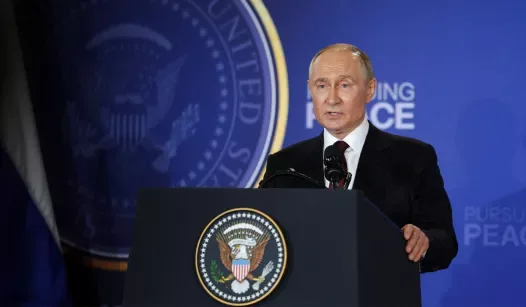Russian President Vladimir Putin has recently unveiled a proposal for peace that raises significant concerns among international observers. The terms he demands are so heavily skewed in favor of Moscow that many analysts believe they would merely serve as a temporary solution, paving the way for further conflict rather than genuine resolution.
At the heart of Putin’s proposal is a call for concessions that would enhance Russia’s geopolitical standing while undermining the sovereignty of neighboring nations. This approach reflects a broader strategy that has characterized Russia’s foreign policy in recent years, where negotiations often mask intentions to expand influence and control.
The terms outlined in Putin’s peace proposal suggest that he is less interested in achieving a lasting peace than in solidifying Russia’s position in the region. By demanding significant territorial and economic concessions from Ukraine and other affected countries, he aims to create a scenario where Russia can dictate the terms of engagement in any future negotiations. This tactic has been observed in various conflicts where Russia has been involved, indicating a consistent pattern of behavior that prioritizes strategic advantage over genuine diplomacy.
Critics of the proposal argue that accepting such terms would not only embolden Russia but also set a dangerous precedent for international relations. It signals to other authoritarian regimes that aggressive actions can yield favorable outcomes if they are willing to leverage military might against their neighbors. The implications of this could extend far beyond Eastern Europe, affecting global stability and security.
Furthermore, the proposal’s timing is noteworthy. As the conflict in Ukraine continues to evolve, Putin’s call for peace may be an attempt to regroup and reassess his strategy in light of ongoing military setbacks. By presenting himself as a peacemaker, he seeks to shift the narrative and regain some measure of control over the situation, while simultaneously preparing for potential future offensives.
The international community’s response to Putin’s proposal will be crucial. Western leaders must carefully weigh their options, balancing the desire for peace with the need to uphold international law and support for Ukraine’s sovereignty. A united front is essential to counteract any attempts by Russia to exploit divisions among Western nations.
In conclusion, while Putin’s peace proposal may be framed as a step toward resolution, it is essential to recognize it for what it truly is: a tactical maneuver designed to further Russia’s interests at the expense of genuine peace. As the situation unfolds, it is imperative for the global community to remain vigilant and committed to supporting democratic nations facing aggression, ensuring that the lessons of history are not forgotten.
